Unlocking Literacy Skills: A Comprehensive Guide for Lifelong Learning (2024)
Topic: Developing Essential Literacy Skills for Lifelong Learning
Let’s start our exploration by acknowledging the importance of literacy skills in shaping our educational journey. We’re going to dive into the nuances of developing these skills, understanding how they act as the compass guiding us towards a path of continuous and successful learning.
Okay, so there we are perfect. Okay, so let’s start by addressing a fundamental question: How often do you read, write, listen, and speak? Always? Excellent! These abilities are the fruits of developed literacy skills, empowering us to obtain information, gain knowledge, communicate effectively, and be part of the world around us. So, what exactly is literacy?

Literacy Unveiled: A Gateway to Lifelong Learning
Literacy, in its essence, is the ability to read, write, speak, and listen, enabling us to obtain information, gain knowledge, communicate, and interact with others. It serves as a passport to being an active participant in the world, fostering the development of values and, most importantly, nurturing the spirit of becoming lifelong learners.
So why is literacy so crucial? If we guide our students in developing these foundational literacy skills, they become motivated to continue learning not just within the classroom but throughout their lives. Our aim is for them to enjoy the process of learning.

Setting the Stage: Three Crucial Considerations
Before we plunge into the specifics, let’s establish three critical principles for our literacy journey:
- The Foundation: Acknowledge that we are not born with the innate ability to read and write; we must teach our brains these skills.
- Sequential Learning: Recognize that the most important learnings are sequenced and depend on one another. Setting a strong foundation is key to future learning success.
- Emotional Connection: Understand that the learning process is directly linked to emotion. Fostering confidence, motivation, and a sense of belonging is crucial for effective learning.
Armed with these principles, let’s unravel the intricacies of developing essential literacy skills.
Supreme Motivation: Igniting the Love for Reading
One of the initial skills we must cultivate is supreme motivation. Why? Because it fuels the development of a love for reading—a habit that, when instilled in young minds, paves the way for a lifelong commitment to reading.
In the early stages, introduce stories to children, creating enjoyable experiences around books. Establish special reading times, incorporate routines, and make the reading environment engaging. The goal is to foster a deep-seated joy for reading.
Creating Literacy Foundations: Spatial Awareness, Laterality, and Directionality
Now, let’s shift our focus to the physical aspects of literacy development: spatial awareness, laterality, and directionality.
Spatial awareness involves being aware of the space around us, our position in that space, and the objects present. Laterality deals with our internal preference for body actions, like being left- or right-handed. Directionality is the ability to project concepts of left and right onto external objects.
These concepts lay the foundation for effective reading and writing. Engaging students in activities that develop spatial awareness, like movements and games, helps them internalize these crucial concepts.

Tracking: The Visual Symphony of Reading
Next on our literacy journey is tracking—the coordinated movement of our eyes while reading. Proper eye movement is essential for effective reading, comprehension, and fluency.
Saccadic movements—exercises where students follow an object without moving their heads—are invaluable for training eye coordination. These activities enhance concentration, ensuring students follow the correct reading path.
Visual Discrimination: Distinguishing the Essentials
Visual discrimination, the ability to distinguish one thing from another, is crucial for identifying words, pictures, and punctuation marks. This skill is vital for comprehension and effective reading.
Engage students in games that challenge their visual discrimination—matching words, finding differences in pictures, or identifying specific elements in a text. These activities refine their ability to discern details, a skill integral to successful literacy.
Mastering Phonological Awareness: The Musicality of Language
Phonological awareness, is the ability to recognize and manipulate the sounds of language
Download the full of the blog PDF here.

